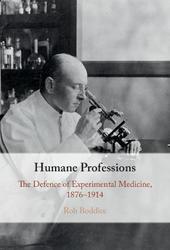
|
Humane Professions: The Defence of Experimental Medicine, 1876-1914
Hardback
Main Details
| Title |
Humane Professions: The Defence of Experimental Medicine, 1876-1914
|
| Authors and Contributors |
By (author) Rob Boddice
|
| Physical Properties |
| Format:Hardback | | Pages:280 | | Dimensions(mm): Height 235,Width 160 |
|
| Category/Genre | History of science |
|---|
| ISBN/Barcode |
9781108490092
|
| Classifications | Dewey:610.72 |
|---|
| Audience | | Professional & Vocational | |
|---|
| Illustrations |
Worked examples or Exercises
|
|
Publishing Details |
| Publisher |
Cambridge University Press
|
| Imprint |
Cambridge University Press
|
| Publication Date |
28 January 2021 |
| Publication Country |
United Kingdom
|
Description
In this compelling history of the co-ordinated, transnational defence of medical experimentation in the nineteenth and early twentieth centuries, Rob Boddice explores the experience of vivisection as humanitarian practice. He captures the rise of the professional and specialist medical scientist, whose metier was animal experimentation, and whose guiding principle was 'humanity' or the reduction of the aggregate of suffering in the world. He also highlights the rhetorical rehearsal of scientific practices as humane and humanitarian, and connects these often defensive professions to meaningful changes in the experience of doing science. Humane Professions examines the strategies employed by the medical establishment to try to cement an idea in the public consciousness: that the blood spilt in medical laboratories served a far-reaching human good.
Author Biography
Rob Boddice is currently a senior research fellow at the Academy of Finland Centre of Excellence in the History of Experiences, Tampere University, Finland. He is an internationally renowned scholar in the histories of emotions, science and medicine. His previous volumes include The Science of Sympathy (2016), Pain: A Very Short Introduction (2017), The History of Emotions (2018) and A History of Feelings (2019). This is his tenth book.
Reviews'Humane Professions is an absorbing, and vitally important, account of the response of medical scientists from 1876 to 1914 to the anti-vivisection movement's demand for legal regulation. Boddice has pulled back the curtain on the development of an internationally networked defence of experimental science for the lay public based on depicting the medical researcher as a heroic humanitarian.' Bernard Lightman, York University 'Humane Professions is a rich and perceptive account of experimental priorities in medical science that refuses to take for granted the stakes of scientific knowledge and its production for actors inside and outside professional circles. Boddice shows how, at its core, the story of making knowledge is a story of claiming humanness.' Todd Meyers, McGill University '... a compelling account ... Well-written and meticulously researched ... Historians ... will find Humane Professions a very valuable addition to the historiography.' Karen Ross, Social History of Medicine 'Boddice's book is a welcome addition to the literature of the history of physiology, experimental medicine, biomedical research, and-most of all-the antivivisection movement. It provides valuable insight into a dynamic period when medical science was transformed from a largely solitary, self-funded activity into an international enterprise deemed worthy of philanthropic and government support. The book is well written.' W. Bruce Fye, Bulletin of the History of Medicine 'Boddice's depth of research is impressive ... Humane Professions is a book that should be carefully considered by historians of medicine and biological science focused on the nineteenth and twentieth centuries' Sarah E. Naramore, Isis 'The book is well grounded in the relevant historiography and driven by key archvies ... the book is at its strongest as a cultural history tracking the origins and circulation of motifs, messages and homilies.' Peter Hobbins, Canadian Journal of Health History 'Boddice closely and systematically reconstructs how the information network of British and American scientists was ultimately able to shift public opinion, not through dry academic research and statistics but through 'emotional labor' - the use of personal stories and sentimental experiences. Although most previous studies of the history of animal experimentation have focused on the voices of anti-vivisectionists, this book also presents the conflict from medical scientists' point of view, allowing for a more comprehensive understanding of how the controversies originated.' Pamela Lee, Journal of Interdisciplinary History
|